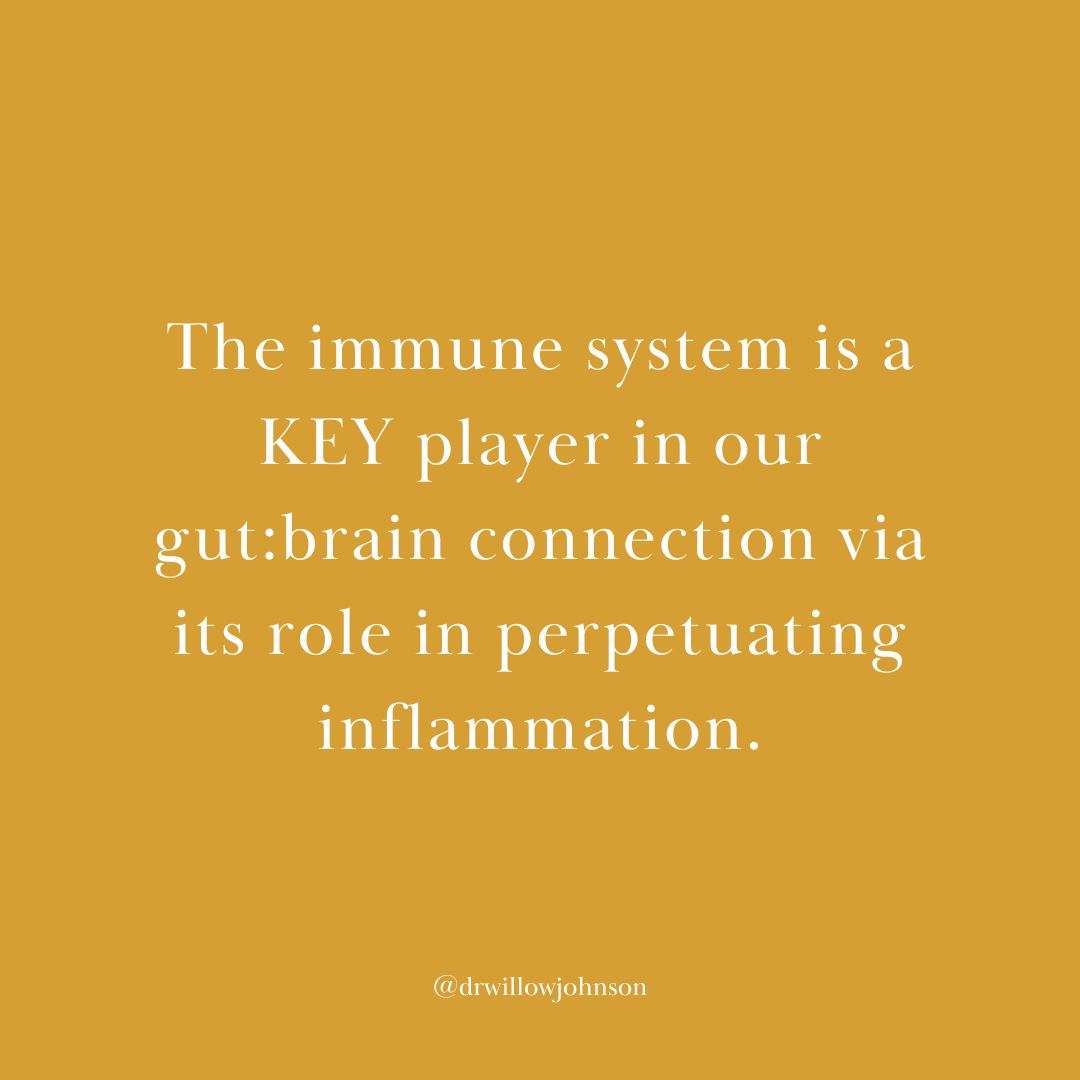HOME
MY STORY
SERVICES
ARTICLES
PRODUCTS
CONTACT
BOOK NOW
SERVICE OVERVIEW
ACUPUNCTURE
LABS
PRESCRIPTIONS
FAQs
I’ve already talked about several mechanisms by which the gut microbiome and brain communicate, such as the enteric nervous system (aka the “2nd brain”) and the vagus nerve, but I haven’t really gotten into the IMMUNE SYSTEM and how dang much of it lives in our guts.
The immune system is a KEY player in our gut:brain connection via its role in perpetuating inflammation.
The fascinating role that inflammation plays in psychiatry has been receiving increasing research attention with studies establishing a link between higher inflammatory markers and metabolites and depression. Read on to understand why and how this is the case, and what to do about it!
Some of you may have heard but many are surprised to find out that ~70% of our immune cells exist in our gut (called the gut-associated lymphoid tissue or GALT). The immune system is responsible for inflammation as part of its natural response to infection, injury, or tissue damage. When the body detects a threat, such as a virus or bacteria, the immune system responds by releasing inflammatory molecules to fight off the invader and attract more immune cells to the site of infection or injury. The immune cells then work to eliminate the threat and repair any damage. This response is known as acute inflammation and is an essential part of the body’s natural defence mechanism.
However, chronic inflammation can occur when the immune system continues to release inflammatory molecules even when there is no active threat or infection. This chronic inflammation can be caused by various factors, such as stress, poor diet, lack of exercise, or exposure to environmental toxins to name a few.
When the gut is inflamed, it can lead to a disruption in the balance of gut bacteria, which can trigger the release of inflammatory cytokines and other immune system molecules (see the vicious cycle?). These inflammatory signals can activate the vagus nerve, which sends signals from the gut to the brain, triggering a systemic (i.e. body wide or multiple organ systems) immune response that can affect mood and behaviour.
Inflammation can also disrupt the production of neurotransmitters such as serotonin and dopamine (like we talked about last week), which are involved in regulating mood and behavior. Inflammation can also lead to increased production of stress hormones such as cortisol (again, note the chicken-and-egg cycle), which can contribute to feelings of anxiety and depression.
Beyond the effect on our microbiome, vagus nerve, neurotransmitters, and levels of ‘stress hormone’ cortisol, these inflammatory molecules have been shown to disrupt processes like synaptic plasticity in the neurons and neurocircuits related to mood regulation (essentially, whether your neurons are whispering to each other or shouting, as the brain changes and adapts according to the information you’re sending it… via the stress you carry, the foods you eat, and the lifestyle you’re living).
I find it’s helpful for patients to hear and understand some of this stuff in order to really BUY IN to the fact that their gut health may be impacting their moods. Especially those people that are not experiencing any obvious digestive symptoms (yes, this can be happening and you don’t have any GI symptoms).
I have a very analytical patient who is superb at tracking symptoms to identify potential triggers. Time and time again when reintroducing dairy into her diet, she experiences symptoms of depression that lifts a few days later. Shortly into our time together, she went on antidepressant medication and now, looking back – after a lengthy journey into healing her gut post-Celiac diagnosis – she feels she was in a sense misdiagnosed. Her depression was a SYMPTOM of gut inflammation. And boy do I see this story on repeat in my practice (be it anxiety, depression, low mood, low motivation/apathy, chronic fatigue, brain fog, exacerbation in ADHD or OCD, etc.).
If you’ve got mood stuff going on and you haven’t had a comprehensive work-up to rule out nutrient deficiencies (e.g. iron, B12, omega 3 fatty acids, vit D, Magnesium, + more), systemic or gut inflammation, hormone imbalances, and basic nutritional, diet, & lifestyle factors, consider doing so. If you need help, I’m here! Don’t hesitate to reach out 🙂
- Dr. Willow
Leave a Reply
WILLOW
meet
I help women achieve optimal digestive and hormonal wellness through a root cause, individualized approach to medicine that utilizes functional lab testing, diet and lifestyle modification, nutritional and herbal medicine, and acupuncture to re-establish lasting health.
LEARN MORE
women's ♀️ group health program coming soon, stay tuned 👀!
Gut health program coming soon, stay tuned 👀!
join
THE COMMUNITY
I WANT IN!
Between my wait listed practice and being Mom, I don't email often, but I'm working behind the scenes to bring you major value and I'd love to be able to tell you about it when it is ready (along with some more personal shares).

Be the first to comment